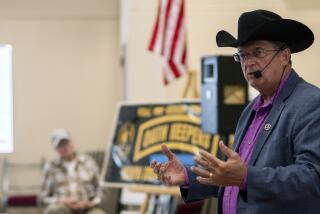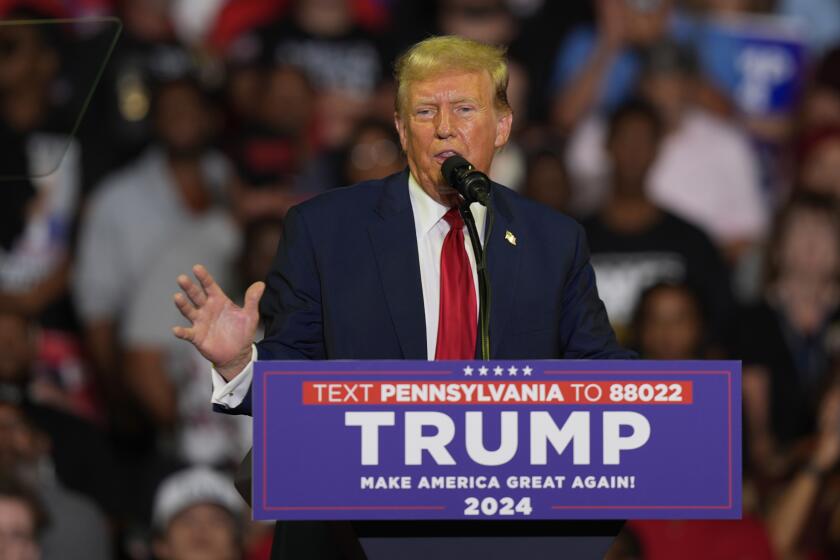Uribe seeks to allay concerns
Colombian President Alvaro Uribe labored Wednesday to repair his country’s reputation in the U.S. capital in the wake of allegations that members of his inner circle had ties to illegal paramilitary groups.
Democrats in Congress have blocked a portion of the $700 million that the government in Bogota receives annually from the United States after reports that Colombia’s army chief, Gen. Mario Montoya, had colluded with paramilitaries.
“I have supported President Uribe for five years. I continue to support him, and I want him to succeed,” said Sen. Patrick J. Leahy (D-Vt.), who has held up about $55 million in U.S. aid to the South American country until the Senate can fully explore “reports of paramilitary infiltration of the Colombian government and military.”
White House officials expressed support for Uribe, the Bush administration’s staunchest ally in South America, and voiced optimism that any wrongdoing would be prosecuted.
“Before my administration, many Colombians had the idea that the only way for my country to reach peace, it was by private criminal organizations,” Uribe said after having breakfast with President Bush at the White House. “Today, the vast majority of Colombians are convinced that we will defeat terrorists.”
National Security Council spokesman Gordon Johndroe said the two leaders discussed the allegations of links between paramilitaries and political allies of Uribe and that Bush stands by his ally.
“It is only under President Uribe that the paramilitaries have had to face justice,” Johndroe said.
“The Colombian government has been forthright in calling for investigations into all allegations of wrongdoing, regardless of rank or title.”
The allegations also were prominent in a series of meetings Uribe held on Capitol Hill. Rep. Sander M. Levin (D-Mich.), chairman of the House Ways and Means subcommittee on trade, said committee members had a “frank discussion” with Uribe about problems in Colombia.
“There’s a lot of uncertainty. The uncertainty has to be addressed. We’re going to do that,” Levin said.
Uribe makes frequent trips to Washington to lobby the White House and Congress to support what is known as Plan Colombia, a U.S.-financed anti-drug program centered on crop eradication and military aid. Since 2000, Colombia has received $4.7 billion for the effort, making the nation the recipient of the largest share of U.S. aid outside the Middle East and Afghanistan.
Uribe is seen as a political counterweight to Venezuela’s leftist and anti-U.S. leader, President Hugo Chavez. Although still highly popular in his homeland, Uribe has come under increasing fire in the Democratic-controlled U.S. Congress because of revelations concerning alleged human rights abuses in Colombia as well as the alleged ties between his inner circle and paramilitary armies.
The Times reported in March that the CIA had obtained intelligence indicating that Montoya, the army chief, collaborated with militias during a 2002 anti-insurgency operation in the area of Medellin. Subsequent incursions there by paramilitary armies allegedly killed 14 people. Uribe’s government has denied that he or Montoya knew in advance of the paramilitary sweeps.
Eight members of the Colombian Congress have been jailed in connection with investigations of ties between the right-wing militias and the government. The foreign minister, a close Uribe ally, also has been forced to resign. Colombia’s former secret police chief, Jorge Noguera, was arrested in February on charges of giving paramilitary leaders information on left-wing labor organizers, some of whom were later killed.
On Capitol Hill, Uribe met privately with a bipartisan group of senators, including Leahy, and members of the House Foreign Affairs and Ways and Means committees. He is due to meet with House Speaker Nancy Pelosi (D-San Francisco) today.
*
maura.reynolds@latimes.com
Staff writer Chris Kraul, The Times’ Bogota Bureau chief, contributed to this report while on assignment in Baghdad.
More to Read
Sign up for Essential California
The most important California stories and recommendations in your inbox every morning.
You may occasionally receive promotional content from the Los Angeles Times.











